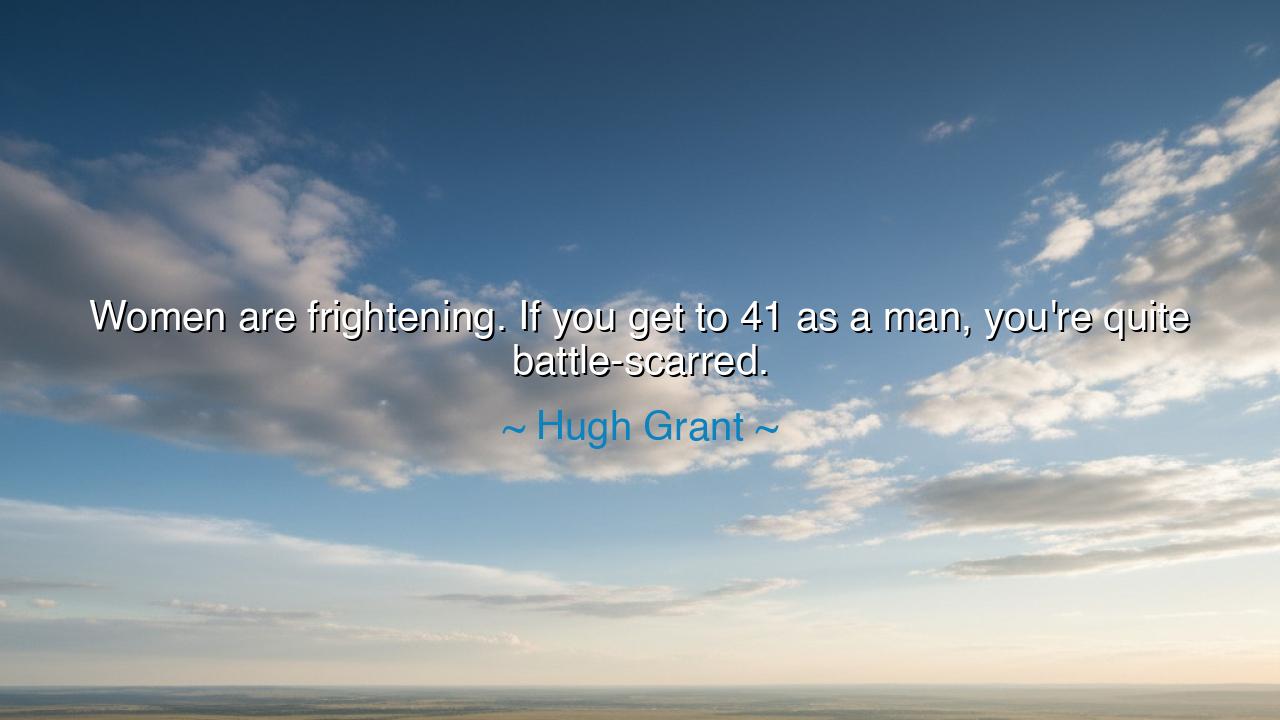
Women are frightening. If you get to 41 as a man, you're quite






Hugh Grant, with humor laced in truth, once confessed: “Women are frightening. If you get to 41 as a man, you’re quite battle-scarred.” Though spoken lightly, his words carry the echoes of ancient struggles between the hearts of men and women. He portrays women not as weak or simple, but as formidable—beings whose strength, mystery, and will can leave even seasoned men marked by the encounters of love, loss, and longing.
The essence of his saying is that life’s deepest struggles are not always fought on battlefields of stone, but within the realm of relationships. To love, to pursue, to fail, to rise again—these are wounds and victories no less profound than those won in war. The battle-scarred man of 41 is one who has known passion and heartbreak, joy and sorrow, and who has learned that the heart is the greatest battleground of all.
History offers many mirrors to this truth. Consider Odysseus, who survived the Trojan War only to face the greater trial of returning to Penelope. His wanderings were filled with temptations, rivalries, and trials of faithfulness. Though he fought gods and monsters, it was the steadfastness of his bond with his wife that proved the greatest challenge and triumph. His tale reminds us that women, in their constancy or their power, have shaped the destinies of men as much as any warlord or king.
Grant’s words also reveal reverence beneath their jest. To call women frightening is to admit their strength, to recognize that they are not passive companions but forces capable of shaping, wounding, or inspiring men. Just as the sea is feared and loved by sailors, women in his reflection are seen as vast, beautiful, and dangerous—never to be taken lightly.
Let this wisdom endure: the scars of love are not signs of defeat but of life lived fully. To emerge from forty years marked by the trials of the heart is not shame but honor, for it means one has dared to feel deeply and risk greatly. As Hugh Grant’s words remind us, women are not ornaments of existence but storms and stars—capable of leaving men trembling, yet also guiding them through the night. For in the end, to be battle-scarred is to have truly lived.






MTHoang Minh Tuan
This quote raises an interesting question about the complexity of relationships. While it’s common for people to have challenging or emotionally taxing experiences in relationships, why does Hugh Grant choose to use the word 'frightening'? Is this reflective of a deeper cultural narrative about men’s vulnerability in relationships? It’s worth considering how much of this sentiment is rooted in societal expectations of masculinity and the emotional defenses men often build up.
H8Chi Hai 8a3_
Hugh Grant’s quote plays on the trope of the 'battle-scarred' man who’s been through the emotional wringer, but is this an accurate portrayal of relationships? Does this quote inadvertently perpetuate the idea that men need to fight against or survive their relationships with women? Could there be a more empowering way to discuss the challenges of relationships without framing them as a war zone or something to be feared?
NMXuan Ngoc Mai
It’s curious that Hugh Grant frames relationships in such a negative light, especially considering his public persona. Does this imply that men, at a certain age, are somehow worn down by the complexities of women or relationships? Or does it reflect a deeper societal belief that men and women are fundamentally at odds? Can we unpack the idea that relationships with women are something to be feared or conquered?
UGUser Google
This quote feels a bit outdated and perhaps even unfair in its generalization of women. To say that women are 'frightening' seems to suggest a simplistic view of gender dynamics. Are relationships really that difficult for men, or is this just a product of certain societal expectations about masculinity? It’s interesting to consider how much of this 'battle-scarred' feeling comes from personal insecurities or societal pressures.
THNguyen Thu Ha
Hugh Grant’s comment seems to reflect a certain level of discomfort with relationships, particularly with women. The idea that women are 'frightening' may be more of a generalization than a thoughtful perspective. What is it that makes him feel 'battle-scarred' by relationships at the age of 41? Could this reflect a personal experience, or is it an overblown exaggeration of the challenges of intimate connections?